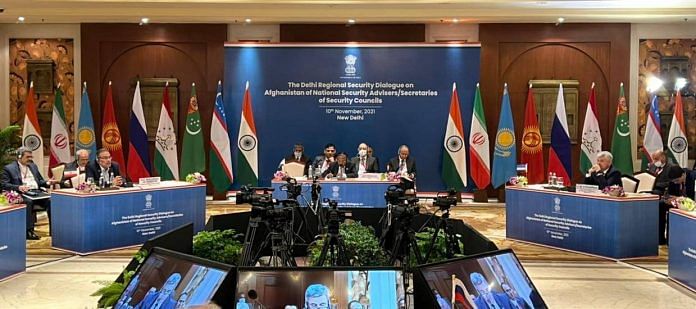New Delhi: The national security advisers (NSAs) of countries in Afghanistan’s neighbourhood Wednesday sent out a strong message to Kabul, currently ruled by the Taliban, to ensure that the country does not become a haven for global terrorism. They also highlighted the violation of women’s rights in Afghanistan as well as the need for humanitarian assistance for the people there.
At the Delhi chapter of the Regional Security Dialogue, which was chaired by National Security Adviser Ajit Doval, the participating nations — Russia, Iran, Kazakhstan, Kyrgyzstan, Tajikistan, Turkmenistan and Uzbekistan, apart from India — issued a joint statement called the Delhi Declaration on Afghanistan.
“During the meeting, the national security advisers/secretaries of the national security councils, condemned in the strongest terms all terrorist activities and reaffirmed their firm commitment to combat terrorism in all its forms and manifestations, including its financing, the dismantling of terrorist infrastructure and countering radicalisation, to ensure that Afghanistan would never become a safe haven for global terrorism,” the statement said.
On the issue of humanitarian aid and assistance for the Afghan people, the statement added that “humanitarian assistance should be provided in an unimpeded, direct and assured manner to Afghanistan”. It also needs to be ensured that the assistance is “distributed within the country in a non-discriminatory manner across all sections of the Afghan society”, the statement said.
The participants of the meeting included Ali Shamkhani, Secretary, Supreme National Security Council (Iran); Karim Massimov, Chairman of National Security Committee (Kazakhstan); Marat Mukanovich Imankulov, Secretary of the Security Council (Kyrgyzstan); Nikolai P. Patrushev, Secretary, Security Council (Russia); Nasrullo Rahmatjon Mahmudzoda, Secretary, Security Council (Tajikistan); Charymyrat Kakalyyevvich Amavov, Deputy Chairman of Cabinet of Ministers (Turkmenistan); and Victor Makhmudov, Secretary, Security Council (Uzbekistan).
Pakistan and China did not attend the meeting. Afghanistan, which had participated in the last two rounds of the meeting in 2018 and 2019, was not invited by India as New Delhi does not officially recognise the interim Taliban regime.
The NSAs Wednesday also called on Prime Minister Narendra Modi, and had a “very substantive exchange with him”, official sources said.
Also read: Delhi NSA meet talks of ‘coordination’, says Taliban rule has ‘implications’ for entire region
‘Collective cooperation’ against terrorism, drug trafficking
The countries vowed “collective cooperation” to tackle the menace of radicalisation, extremism, separatism and drug trafficking in the region that they said has the potential to increase under the Taliban regime.
They also expressed “deep concerns” over the terrorist attacks and violence in Kunduz, Kandahar and Kabul since the Taliban takeover of the war-ravaged country.
The countries also said Afghan territory should not be used for “sheltering, training, planning or financing any terrorist acts”.
During the talks, the parties underlined the importance of all relevant UN resolutions on Afghanistan. “The participants noted that the United Nations has a central role to play in Afghanistan and that its continued presence in the country must be preserved,” the declaration said.
Support for ‘peaceful, secure and stable’ Afghanistan
The participating countries said while they will respect the sovereignty, unity and territorial integrity of Afghanistan and follow the principle of non-interference in its internal affairs, they will continue to seek peace, security and stability in the country.
The countries stressed the “necessity of forming an open and truly inclusive government that represents the will of all the people of Afghanistan and has representation from all sections of their society, including major ethno-political forces in the country”.
“Inclusion of all sections of the society in the administrative and political structure is imperative for the successful national reconciliation process in the country,” they added.
The countries emphasised the “importance of ensuring that the fundamental rights of women, children and minority communities are not violated”. They “expressed concern over the deteriorating socio-economic and humanitarian situation in Afghanistan, and underlined the need to provide urgent humanitarian assistance to the people of Afghanistan”.
This was the third round of this format of talks. The first two rounds took place in Tehran in 2018 and 2019. The next round will take place in 2022.
This report has been updated with additional information
(Edited by Neha Mahajan)
Also read: NSA meet is a chance for Delhi to show Taliban victory doesn’t mean India’s defeat



